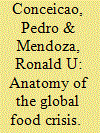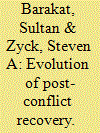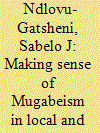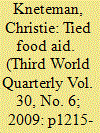|
|
|
Sort Order |
|
|
|
Items / Page
|
|
|
|
|
|
|
| Srl | Item |
| 1 |
ID:
090209


|
|
|
|
|
| Publication |
2009.
|
| Summary/Abstract |
Dramatic food price increases affected much of the developing world in 2008. Even as food prices have begun to relax in 2009, this trend is highly uneven across countries, and in many countries local food prices remain high relative to past levels. Furthermore, the challenge of addressing the root causes of the global food crisis remains. This paper contributes to the policy discussions in this area by offering a preliminary diagnostic of the possible factors behind the global food crisis that erupted in 2008. Some are more immediate and possibly short-term in nature, such as the volatility in the commodities markets arising from short-term financial speculation. Others, however, are going to or have already started to affect countries' food security in the medium to longer term. These include rising and changing patterns of consumption in fast-growing and large developing countries like China and India, the possibly increasing trade-off between biofuels and food, and the unfolding effects of climate change. Keeping in mind the possible structural features of the global food landscape from here on, the paper outlines a framework for policy actions, both unilateral and collective, to address the food crisis and ensure future global food security.
|
|
|
|
|
|
|
|
|
|
|
|
|
|
|
|
| 2 |
ID:
090205


|
|
|
|
|
| Publication |
2009.
|
| Summary/Abstract |
Since the 2007 food crisis, controversy has engulfed biofuels. Leading up to the crisis, world-wide interest in these fuels-which include biomass, biogas, bioethanol, and biodiesel-had been surging as states increasingly saw these as a way to meet greenhouse gas reduction targets and promote sustainable economic development. Now some consumers, notably in Europe, are scaling back demand as they worry that biofuels are responsible for increased food prices and deforestation. In contrast, some states-particularly Brazil and the USA, the world's leading bioethanol producers-continue to promote biofuel development, especially in developing countries. Partnerships arising from these efforts, we argue, reflect new patterns in the international political economy, where trade relationships among developing countries are strengthening, and where economic lines between developed and emerging developing countries are blurring. Given previously observed patterns of resource exploitation involving complex webs of North-South and South-South trade (such as for resources like palm oil in Indonesia), we anticipate that the emerging political economy of biofuels will repeat and reinforce many of these same environmentally destructive trends.
|
|
|
|
|
|
|
|
|
|
|
|
|
|
|
|
| 3 |
ID:
090204


|
|
|
|
|
| Publication |
2009.
|
| Summary/Abstract |
Recent history has been marked by the rise of post-conflict intervention as a component of military and foreign policy, as a form of humanitarianism and as a challenge to Westphalian notions of state sovereignty. The terms of debate, the history of the discipline and the evolution of scholarship and practice remain relatively under-examined, particularly in the post-9/11 period in which post-conflict recovery came to be construed as an extension of conflict and as a domain concerned principally with the national security of predominantly Western countries. The subsequent politicisation of post-conflict recovery and entry of post-conflict assistance into the political economy of conflict have fundamentally changed policy making and practice. The authors argue that research into post-conflict recovery, which must become increasingly rigorous and theoretically grounded, should detach itself from the myriad political agendas which have sought to impose themselves upon war-torn countries. The de-politicisation of post-conflict recovery, the authors conclude, may benefit from an increasingly structured 'architecture of integrated, directed recovery'.
|
|
|
|
|
|
|
|
|
|
|
|
|
|
|
|
| 4 |
ID:
090211


|
|
|
|
|
| Publication |
2009.
|
| Summary/Abstract |
Most official analyses of the recent food price crisis have focused on the market fundamentals of supply and demand for food as key explanatory factors. As a result, most of the policy recommendations emanating from the major international institutions include measures to boost supply and temper demand. In this paper I argue that international macroeconomic factors played a key role in fostering both price volatility and vulnerability, and as such they need to be recognised. With respect to the recent price volatility, the weak US dollar and speculation on agricultural commodities futures markets greatly influenced agricultural prices. With respect to price vulnerability, global economic forces played an important role in dampening production incentives in the world's poorest countries over the past 30 years, leading to a situation of food import dependence. Policy responses to the food crisis must consider the role of these broader international macroeconomic forces-both in the immediate context and their longer term impact.
|
|
|
|
|
|
|
|
|
|
|
|
|
|
|
|
| 5 |
ID:
090207


|
|
|
|
|
| Publication |
2009.
|
| Summary/Abstract |
This article connects the literature on the political economy of conflict with the mediation of peace processes and elaborates the conceptual and practical value offered by this perspective. It shows that armed conflicts and groups have economic dimensions that should be recognised and managed in peace processes. An economic perspective helps to understand the multiple disputes within an armed conflict, the disposition of armed groups to engage, and the economic interests of the parties. Focusing on mediated states opens new avenues of engagement through perceiving alternative sub-state authorities and economic networks as an opportunity for dispute resolution. Overall the political economy of conflict and the mediated state offer new vantage points to shape the planning and management of peace processes.
|
|
|
|
|
|
|
|
|
|
|
|
|
|
|
|
| 6 |
ID:
090213


|
|
|
|
|
| Publication |
2009.
|
| Summary/Abstract |
This paper analyses the Indian government's policy response to the Trade-related Intellectual Property Rights Agreement (trips) and examines the implications of this response for food security and farmers. trips has become one of the most controversial agreements of the wto. This is because of its wide and far-reaching mandate and its complex socioeconomic implications. It is argued that the changes made to the Indian Patents Act in response to trips will compromise the food sector and the rights of small farmers by conferring strong rights on upstream agents who produce proprietary agricultural inputs using biotechnology. Not only are these agents able to exert monopoly price control over agricultural inputs for 20 years, they also have the right to determine the conditions under which farmers and researchers use patented processes and products. The paper outlines policy options available to the Indian government to tighten the scope of patentability in the food sector.
|
|
|
|
|
|
|
|
|
|
|
|
|
|
|
|
| 7 |
ID:
090208


|
|
|
|
|
| Publication |
2009.
|
| Summary/Abstract |
President Robert Mugabe of Zimbabwe has emerged as one of the most controversial political figures since 2000, eliciting both admiration and condemnation. What is termed 'Mugabeism' is a summation of a constellation of political controversies, political behaviour, political ideas, utterances, rhetoric and actions that have crystallised around Mugabe's political life. It is a contested phenomenon with the nationalist aligned scholars understanding it as a pan-African redemptive ideology opposed to all forms of imperialism and colonialism and dedicated to a radical redistributive project predicated on redress of colonial injustices. A neoliberal-inspired perspective sees Mugabeism as a form of racial chauvinism and authoritarianism marked by antipathy towards norms of liberal governance and disdain for human rights and democracy. This article seeks to analyse Mugabeism as populist phenomenon propelled through articulatory practices and empty signifiers. As such it can be read at many levels: as a form of left-nationalism; as Afro-radicalism and nativism; a patriarchal neo-traditional cultural nationalism and an antithesis of democracy and human rights. All these representations make sense within the context of colonial, nationalist, postcolonial and even pre-colonial history that Mugabe has deployed to sustain and support his political views.
|
|
|
|
|
|
|
|
|
|
|
|
|
|
|
|
| 8 |
ID:
090206


|
|
|
|
|
| Publication |
2009.
|
| Summary/Abstract |
The idea of development co-operation-the 'development paradigm'-took shape during the decades of global decolonisation and growing political autonomy of the former colonies. It can be understood as a historic reconfiguration of the centre-periphery relationship originally established through colonisation. The rise of new state donors such as China or India questions not only the established modes of development co-operation but also the development paradigm as a whole. Themselves historical products of anti-colonialism and political autonomy understood as non-alignment as well as absolute sovereignty, these new 'Southern' donors question the very idea of development (co-operation) as a Western, postcolonial concept. This paper, first, attempts to characterise the 'development paradigm', providing a historical contextualisation of the development discourse in its continuities and ruptures. Second, it asks what the rise of new state donors such as China and India looks like at the political-normative level as well as at the level of Realpolitik. Lastly, some future consequences of these trends are discussed illustrating the far-reaching (normative) consequences and the necessity to reconsider the established political discourse on development.
|
|
|
|
|
|
|
|
|
|
|
|
|
|
|
|
| 9 |
ID:
090215


|
|
|
|
|
| Publication |
2009.
|
| Summary/Abstract |
'Tied' or 'in-kind' international food aid has been criticised as an implicit form of export subsidy that governments use to circumvent export subsidy restrictions. In addition to displacing agricultural exports, food aid is less efficient than untied aid and depresses local agricultural production in recipient countries. I argue that tied food aid is not protected by the Uruguay Round Agreement on Agriculture and could consequently be challenged under the World Trade Organization's dispute settlement mechanism as a prohibited or actionable subsidy contrary to the Subsidies and Countervailing Measures (scm) Agreement. As the USA is both the largest donor of international food aid and most consistently ties its food aid to domestic agricultural producers, this paper focuses on US policy to describe the challenge that might be advanced under the scm Agreement.
|
|
|
|
|
|
|
|
|
|
|
|
|
|
|
|
|
|
|
|
|